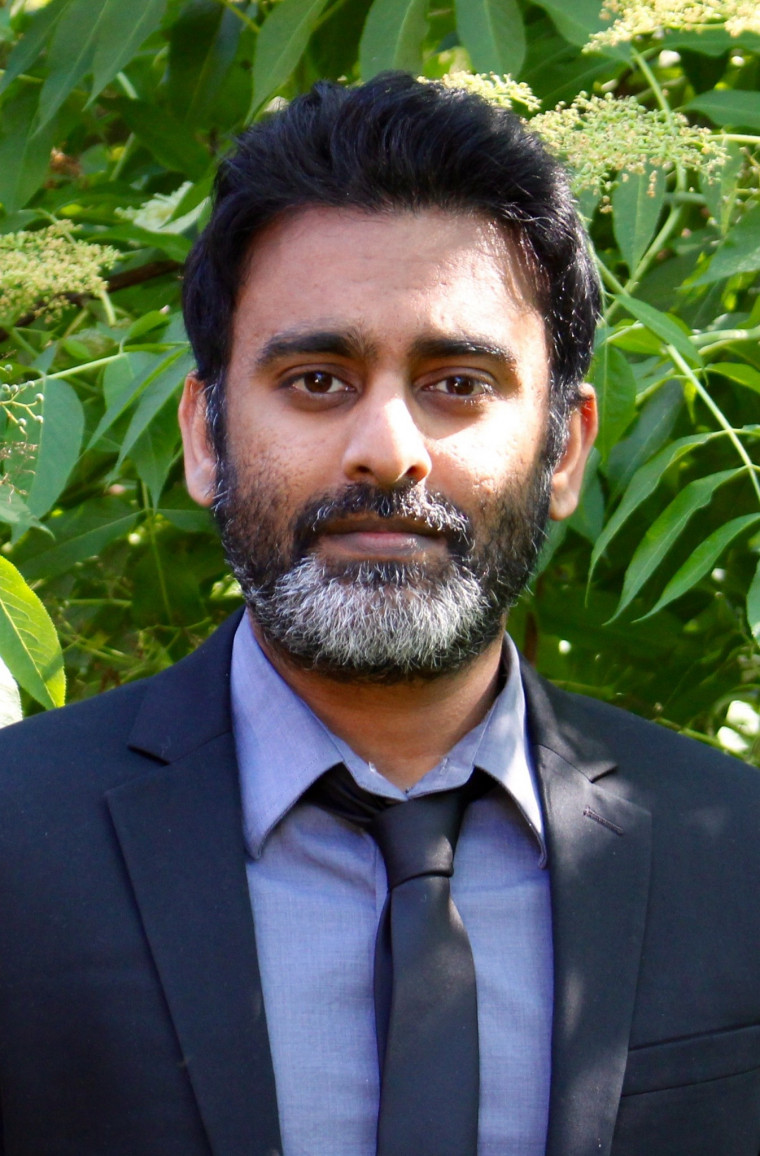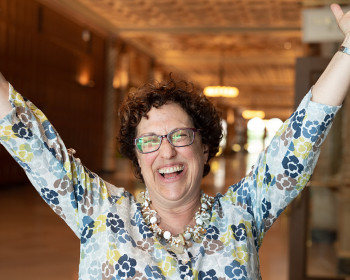Meet Professor Rajesh Reddy, Director of the Animal Law LLM Program
Open gallery

We’re proud to offer the world’s first and only advanced legal degree in animal law at the Center for Animal Law Studies (CALS) at Lewis & Clark Law School. Our Animal Law LLM Program trains the next generation of animal law attorneys from the U.S. and across the globe to be effective and compassionate advocates for animals in all types of legal settings, from litigation to policy work. We sat down with Professor Raj Reddy, Director of the Animal Law LLM Program, to learn about the Program and how we’re advancing animal protection beyond the classroom.
Interview
Q: Let’s start with the basics. For those who aren’t familiar, what exactly is an LLM degree?
A: An LLM, or Masters of Law degree, is an internationally recognized postgraduate degree that is available to lawyers. What makes the LLM unique from a general law degree is that most LLM degree programs focus on a narrow subject matter, like environmental law or tax law. An LLM degree empowers students to specialize in specific areas of the law—even areas that may not have been offered in their previous law school.
Q: The Animal Law LLM Program at CALS has drawn interest from across the globe. Can you share with us where LLM alumni have come from?
A: The Animal Law LLM Program at CALS has indeed drawn academics and practitioners from around the world. In addition to having welcomed numerous U.S. students, candidates in our LLM Program have hailed from countries such as Chile, England, Ireland, France, Switzerland, Kenya, Uganda, Zimbabwe, Tanzania, South Africa, India, Pakistan, Kazakhstan, China, Japan, New Zealand, and Australia, among others. As the global leader in the animal law education, CALS continues to develop the best and brightest talent from around the globe. To learn more about the Program and the impressive diversity of our students who are dedicated to advancing legal protections for animals, check out this short video.
Q: People may be reading this who aren’t already familiar with the practice area of “animal law.” What is animal law and why is studying animal law in the U.S. beneficial to an international student who is interested in animal protection?
A: First developed here in the U.S. in the early 1970s, the animal law field is broad and complex. It of course implicates areas of the law that deal specifically with animals, such as anti-cruelty laws and wildlife conservation. Yet the field also includes those areas that implicitly implicate the interests of animals, areas such as wills and trusts and consumer protection laws. Given the numerous and nuanced ways in which humans use animals and see animals intersect with our lives, the field of animal law is expansive in its scope.
Due to the efforts of generations of animal advocates, the field has witnessed tremendous growth in the US. Studying animal law at CALS, with professors who were involved in the inception of the movement, affords those interested in the field an unparalleled opportunity to seize upon our history of legal developments as models for effecting change in their home jurisdictions. Simply put, no other country offers as rich and as vibrant a history in this arena as the U.S. animal law landscape.
Q: After graduating from the LLM Program, are alumni actually working in the field of animal law? And, if so, how are they making a difference for animals?
A: Students who graduate from our Animal Law LLM Program go on to be leaders in this burgeoning field. Our alumni have developed careers at leading animal law organizations, such as the Animal Legal Defense Fund and Humane Society International, to name just a few. Our alumni have also founded nonprofit animal protection organizations in their home countries. Many have also gone on to lead wildlife prosecution units and wildlife courts and serve as policy advisors back in their home countries. Others have advanced scholarship on new and compelling developments in this field. Our Alumni In Action are effecting change for animals around the world. As two examples, we are proud to share short videos featuring Jim Karani from Kenya (LLM ’16) and Ever Chinoda from Zimbabwe (LLM ’17).
Q: What academic qualifications are necessary to gain admission to the LLM Program and, equally important, what qualities do you look for in applicants?
A: The application deadline is February 1, 2020, for our LLM Program for 2020-2021. To be eligible, applicants must have been awarded a law degree that allows them to practice law. For U.S. candidates, this requirement is fulfilled by the JD degree. For international students, an LLB usually qualifies; however, the ABA offers a full list of qualifying degrees. International students who are not native English speakers or whose instruction was in a language other than English must submit an English proficiency test along with their application. Other academic requirements can be found at our website.
When reviewing applications, we look for students whose efforts demonstrate a clear interest in and commitment to the animal law field. The Program prizes candidates with excellent academic records and strong research and writing skills. In addition to academic qualities, those applicants with established histories of animal advocacy is also looked favorably upon.
Q: CALS has a unique scholarship program. Tell us about it.
A: We do - the ability to study animal law, particularly in the U.S., is out of reach for so many. We wanted to attract the best and brightest animal advocates to our LLM Program, and to help them succeed. So, through the generosity of donors we’ve been able to create a scholarship program that allows students to specialize in animal law by providing them, for example, tuition, housing, health insurance, and other things of need to be able to study here in the U.S. and go back to their home countries to effect change for animals.
Q: When and how did you become interested in devoting your career to animal protection?
A: Although I considered myself an animal advocate from a relatively young age, my determination to effect change on their behalf was sparked by an Animals in Literature course I taught at Indiana University. In it, my students engaged with questions such as why authors like Franz Kafka in The Metamorphosis and Art Spiegelman in Maus chose to anthropomorphize animals in order to articulate human experiences, oftentimes those of intense discrimination and class exploitation. It was by interrogating how these texts sought to lift humans out of these states of commodification and exploitation that we arrived at the question of what duty we also owed, if any, to those animals subjected to similar conditions now. To say the least, it was that burning question that compelled me to seek out the most effective avenues to improve animals’ lives and, not coincidentally, led me to apply to Lewis & Clark Law School for its Animal Law Program some years later.
Q: As an alumni yourself, why should aspiring lawyers put Lewis & Clark Law School on their list of law schools to consider?
A: It was my determination to effect change for animals that drove me to apply to Lewis & Clark Law School. A sizable percentage of our students come to Lewis & Clark Law School for the animal law program. To say the least, Lewis & Clark is the epicenter of animal law as an academic field, one evidenced by its history of firsts. For example, Lewis & Clark is home to the very first Animal Legal Defense Fund Student Chapter, the first (and only) journal dedicated exclusively to Animal Law, the first Animal Law Program with the Center for Animal Law Studies, the first Animal Law Clinic, and the first (and still only) Animal Law LLM Program in the world. Whether at the JD or LLM level, students who attend Lewis & Clark are embraced by a vibrant and active community—and one where students help facilitate one another’s growth as advocates, academics, and leaders in this field.
About the Center for Animal Law Studies
The Center for Animal Law Studies (CALS) was founded in 2008 with a mission to educate the next generation of animal law attorneys and advance animal protection through the law. With vision and bold risk-taking, CALS has since developed into a world-renowned animal law epicenter, with the most comprehensive animal law curriculum offered anywhere. In addition, CALS is the only program that offers a Masters of Law in Animal Law and two Animal Law Clinics. CALS is a nonprofit organization and is only able to provide these educational opportunities through donations and grants.
More Center for Animal Law Studies Stories
Center for Animal Law Studies is located in Wood Hall on the Law Campus.
MSC: 51
email cals@lclark.edu
voice 503-768-6960
Center for Animal Law Studies
Lewis & Clark Law School
10101 S. Terwilliger Boulevard MSC 51
Portland OR 97219

